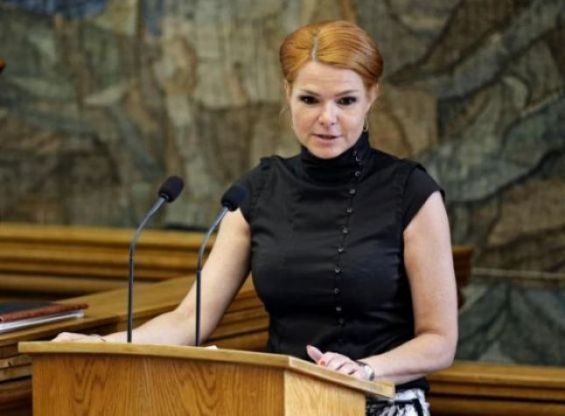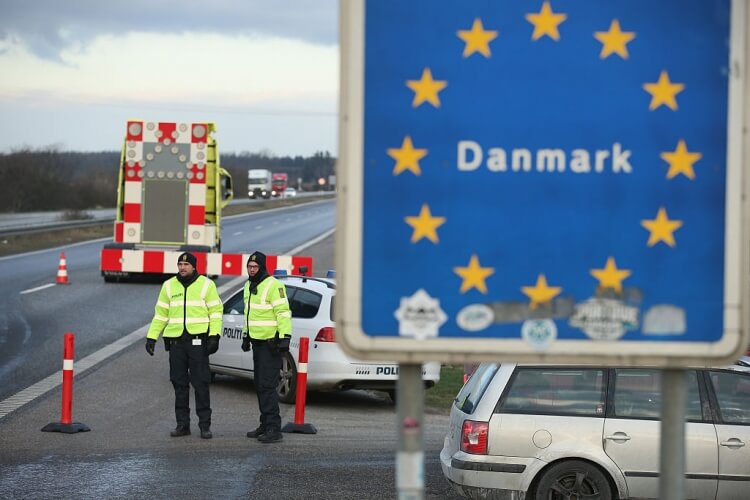From Patriotic Alternative.
Edward Saunders
Opposing mass immigration using the institutions and democratically elected government? Is that even possible? Well the answer, however sceptical you may be, is yes. As the country from where some of our ancestors came and one of the closest among our genetic relatives, the Danes have managed to clampdown on arrivals. The story of how they did it is riddled with right wing failure and left wing pragmatism. The latter is by far the most surprising element of it all, and contains an nugget of shameless opportunism. But by far the most sinister aspect was the elites turning on one of their own, leading to her eventual imprisonment.
It all started back in 2015, when a centre-right bloc of parties won the country’s general election, and Inger Stojberg was appointed Minister for Immigration and Integration. She quickly became known for her hawkish statements, and limited the amount of state services asylum seekers could receive. She also implemented a law confiscating their valuables at the border, which were then sold to help pay for their benefits. One of the most controversial (and funniest) things she did was pose with a cake marking the 50th immigration restriction she had introduced since taking office. Most importantly though she managed to lower asylum seeker approvals from 11,000 when she came to office to just 2,700 in 2017.

Convicted
And of course the establishment then decided to take her out. One of the most common sense policies she introduced was to separate spouses at the border if one of them was underage, because they could be in a forced marriage. Yet the media and political class, including many in her own coalition’s ranks, decided this was ‘insane’ and used it as an excuse to finally move against her. The Danish parliament, the Folketinget, voted to impeach her in February 2021, she was convicted without a jury in December of that year and sentenced to 60 days in prison.
Now you might think this would mean that all her immigration restrictions would have been reversed, the borders opened and everything would go back to how it was. Yet this is not what happened at all. Bizarrely when the Social Democrats and their allies won the 2019 general election, they adopted an even stronger anti-immigration position. Their leader Mette Frederiksen knew she could only win by being anti-immigration, so despite the establishment’s takedown of Stojberg her legacy was secured. Frederiksen commented that ‘it is becoming increasingly clear that the price of unregulated globalisation, mass immigration and the free movement of labour is paid for by the lower classes.’ This quote alone did a lot to change the political landscape in the country.
One of her key policies was to pass a law – despite UN and EU opposition – which allows Denmark to process asylum seekers outside of Europe. This means that if you turn up in the country to make a claim, you are usually removed abroad to be processed. This acts to discourage men wandering across the border as their prospect of accommodation is very small. She also rescinded the temporary visas granted to Syrians, declaring their country was safe to return to. Although immigration increased in 2022, this was largely because of Ukrainian refugees, who contributed 45% of the country’s population growth last year. Meanwhile the largest foreign groups are mostly other Europeans such as the Polish.
Denmark makes Britain look absolutely ridiculous. The fact that neither our centre-right or centre-left can do anything about migration is absurd, because in Copenhagen both sides fall over themselves to limit the numbers. This is not to say there aren’t problems with crime and non-White immigration is occurring, but it doesn’t come anywhere close to what we’re dealing with. If you add the ethnic Danish population (86%) with the White ‘other’ category, the overall White population is above 90%. That’s about where Britain was in the late 1990s.
Electoral differences
The important thing to consider here is that the taboo of opposing immigration among Denmark’s elite has largely disappeared. Although they prosecuted Inger Stojberg, they were actually forced to continue her policies to avoid being wiped out at the ballot box. This is similar to what Farage achieved with UKIP – an outflanking manouvre which forced the Conservative Party to consider a Brexit referendum. The difference is that Denmark has proportional representation, something which makes it much easier for smaller parties to cause problems and makes a two party system impossible. And it is largely the two party system, entrenched and unthreatened, which makes it so difficult to reverse mass immigration in Britain and America.
Meanwhile Britain’s Rwanda deportation plan doesn’t work and nor does our wider asylum system. The reason for this is that Conservative Party ministers refuse to change the law to make their policies legal, whereas in Denmark they do this as a matter of course. For example Mette Frederiksen passed the law mentioned above enabling her plan, whilst Conservative ministers made it a policy without enshrining it in law. This meant that Britain’s Rwanda plan could be challenged in the courts whilst Denmark’s couldn’t be challenged. (A large part of Britain’s problem in tackling immigration is down to the stupidity of our political class.)
The reality is that the policy of mass immigration is not unquestionable or unstoppable, and our Nordic cousins have shown a way of fighting back. Yes immigration still remains, but they have built a legislative framework that favours European arrivals instead of those from the Third World. And they have now gone one step further, and started the process of disbanding migrant ghettos and replacing the non-White inhabitants with Ukrainians. This is by far the most based policy to come out of Europe for a long while, and hopefully a sign of things to come. On top of that, the arrival of a centre-left bloc which is anti-immigration shows that restrictions aren’t necessarily a right wing policy. Bravo, Denmark.
From Patriotic Alternative.










